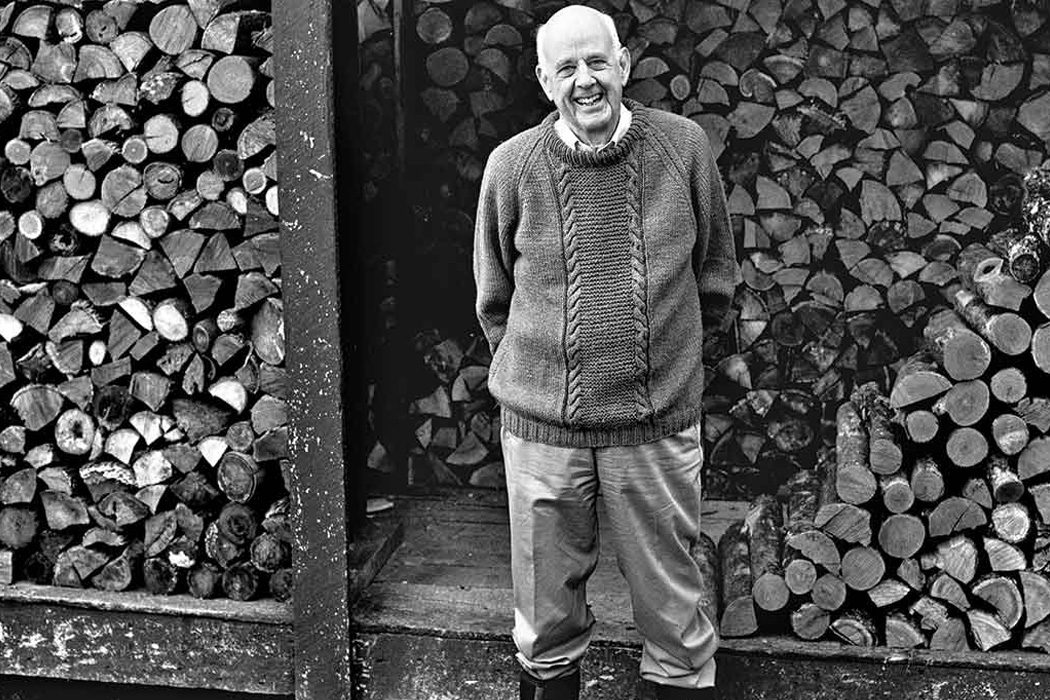Well, it’s been a disorienting couple of weeks under the new regime, and while sales of George Orwell’s 1984 pushed the dystopian novel into the top ten on Amazon, we here at Topology Magazine decided to turn to one of the wisest people we know of to help us understand what we are experiencing. Inspired by Stephen Colbert’s “fake interview” with then President-elect Donald Trump in December 2016, we present our own fake interview with author, farmer, and activist Wendell Berry. All of Mr. Berry’s “responses” to our questions are direct quotes from his 1979 essay “Standing By Words,” published in the essay collection Standing By Words (North Point Press, San Francisco 1983).
Topology Magazine: What is your general impression of the state of public discourse after the first few weeks of the new administration?
Wendell Berry: My impression is that we have seen, for perhaps a hundred and fifty years, a gradual increase in language that is either meaningless or destructive of meaning. And I believe that this increasing unreliability of language parallels the increasing disintegration, over the same period, of persons and communities.
TM: Kellyanne Conway, Donald Trump’s former campaign manager, said in an interview that his administration had presented “alternative facts” to the American public. What does this mean for the future of public discourse?
WB: In our ordinary dealings with each other, we take for granted that we cannot understand what is said if we cannot assume the accountability of the speaker, the accuracy of his speech, and mutual agreement on the structures of language and the meanings of words. We assume, in short, that language is communal, and that its purpose is to tell the truth… And there are times, according to the only reliable ethics we have, when one is required to tell the truth, whatever the urgings of purpose, audience, and situation. Ethics requires this because, in terms of the practical realities of our lives, the truth is safer than falsehood. To ignore this is simply to put language at the service of purpose—any purpose. It is, in terms of the most urgent realities of our own time, to abet a dangerous confusion between public responsibility and public relations.
TM: I’m hoping you’ll help us understand some of the recent language coming out of the new administration. White House Press Secretary Sean Spicer is quoted as saying: “Yes, I believe we have to be honest with the American people…. I think sometimes we can disagree with the facts…. our intention is never to lie to you.” Isn’t that statement a blatant contradiction?
WB: [They] speak a language that is diminished by inordinate ambition: the taking of more power than can be responsibly or beneficently held. It is perhaps a law of human nature that such ambition always produces a confusion of tongues… Real language, real discourse are destroyed. People lose understanding of each other, are divided and scattered. Speech of whatever kind begins to resemble the speech of drunkenness or madness.
TM: In his remarks on the first day of Black History Month, Donald Trump said, “I’m ready to do my part, and I will say this: We’re gonna work together. This is a great group, this is a group that’s been so special to me. You really helped me a lot. If you remember I wasn’t going to do well with the African-American community, and after they heard me speaking and talking about the inner city and lots of other things, we ended up getting—and I won’t go into details—but we ended up getting substantially more than other candidates who had run in the past years. And now we’re gonna take that to new levels.” What can he possibly have meant by this?
WB: In this degenerative accounting, language is almost without the power of designation because it is used conscientiously to refer to nothing in particular… It is not language that the user will very likely be required to stand by or to act on, for it does not define any personal ground for acting or standing… And it works directly against the conventionality, the community life, of language, for it holds in contempt, not only all particular grounds of private fidelity and action, but the common ground of human experience, memory, and understanding from which language rises and on which meaning is shaped. It is a tyrannical language: tyrannese.
TM: Donald Trump has also said, “Look, having nuclear—my uncle was a great professor and scientist and engineer, Dr. John Trump at MIT; good genes, very good genes, OK, very smart, the Wharton School of Finance, very good, very smart —you know, if you’re a conservative Republican, if I were a liberal, if, like, OK, if I ran as a liberal Democrat, they would say I’m one of the smartest people anywhere in the world—it’s true!—but when you’re a conservative Republican they try—oh, do they do a number—that’s why I always start off: Went to Wharton, was a good student, went there, went there, did this, built a fortune—you know I have to give my like credentials all the time, because we’re a little disadvantaged—but you look at the nuclear deal, the thing that really bothers me—it would have been so easy, and it’s not as important as these lives are (nuclear is powerful; my uncle explained that to me many, many years ago, the power and that was 35 years ago; he would explain the power of what’s going to happen and he was right—who would have thought?), but when you look at what’s going on with the four prisoners—now it used to be three, now it’s four—but when it was three and even now, I would have said it’s all in the messenger; fellas, and it is fellas because, you know, they don’t, they haven’t figured that the women are smarter right now than the men, so, you know, it’s gonna take them about another 150 years—but the Persians are great negotiators, the Iranians are great negotiators, so, and they, they just killed, they just killed us.” Can you shed any light on that?
WB: When we reflect that “sentence” means, literally, “a way of thinking” (Latin: sententia) and that it comes from the Latin sentire, to feel, we realize that the concepts of sentence and sentence structure are not merely grammatical or merely academic—not negligible in any sense. A sentence is both the opportunity and the limit of thought—what we have to think with, and what we have to think in. It is, moreover, a feelable thought, a thought that impresses its sense not just on our understanding, but on our hearing, our sense of rhythm and proportion. It is a pattern of felt sense. A sentence that is completely shapeless is therefore a loss of thought, an act of self-abandonment to incoherence.
TM: Chief Strategist Steve Bannon is quoted as saying: “Darkness is good. Dick Cheney. Darth Vader. Satan. That’s power. It only helps us when they (the media) get it wrong. When they’re blind to who we are and what we’re doing.” Should the open worship of power by leaders in this administration be of concern to U.S. citizens?
WB: They all assume that the human prerogative is unlimited, that we must do whatever we have the power to do. Specifically, what is lacking is the idea that humans have a place in Creation and that this place is limited by responsibility on the one hand and by humility on the other… Without this precision of definition, this setting of bounds or ends to thought, we cannot mean, or say what we mean, or mean what we say; we cannot stand by our words because we cannot utter words that can be stood by; we cannot speak of our own actions as persons, or even as communities, but only of the actions of percentages, large organizations, concepts, historical trends, or the impersonal “forces” of destiny or evolution.
TM: What can people do who still care about truth and who want to oppose the deterioration of meaning in public discourse?
WB: If one wishes to promote the life of language, one must promote the life of the community—a discipline many times more trying, difficult, and long than that of linguistics, but having at least the virtue of hopefulness. It escapes the despair always implicit in specializations: the cultivation of discrete parts without respect or responsibility for the whole… What can turn us from this deserted future, back into the sphere of our being, the great dance that joins us to our home, to each other and to other creatures, to the dead and the unborn? I think it is love. I am perforce aware how badly and embarrassingly that word now lies on the page—for we have learned at once to overuse it, abuse it, and hold it in suspicion.
TM: So…all we need is love?
WB: I do not mean any kind of abstract love, which is probably a contradiction in terms, but particular love for particular things, places, creatures, and people, requiring stands and acts, showing its successes or failures in practical or tangible effects. And it implies a responsibility just as particular, not grim or merely dutiful, but rising out of generosity. I think that this sort of love defines the effective range of human intelligence, the range within which its works can be dependably beneficent. Only the action that is moved by love for the good at hand has the hope of being responsible and generous.
TM: One last question. Last Sunday evening the White House released inauguration posters of Donald Trump with the following quote: “No dream is too big, no challenge is to [sic] great. Nothing we want for the future is beyond our reach.” Any thoughts on that?
WB: Desire for the future produces words that cannot be stood by. But love makes language exact, because one loves only what one knows. One cannot love the future or anything in it, for nothing is known there. And one cannot unselfishly make a future for someone else. Love for the future is self-love—love for the present self, projected and magnified into the future, and it is an irremediable loneliness.




